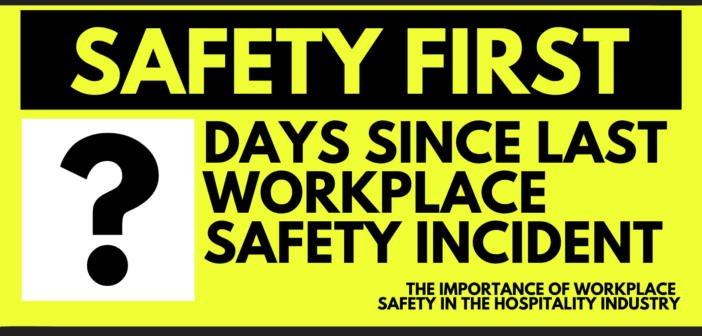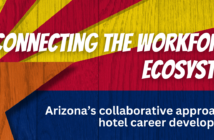by YASMINE MUSTAFA
The hospitality industry is one of the largest in the world. With so many people working in hotels and restaurants, it’s no surprise that there are also a lot of injuries. According to the Bureau of Labor Statistics, more than six million people in the United States are injured at work each year.
Those who work in hospitality have an increased risk for injuries due often to the physical nature of the job. For example, hotel housekeepers often lift heavy items such as luggage, mattresses, furniture, and cleaning supplies weighing up to 20 pounds during their shifts. And busboys may need to lift heavy trays of food or drinks at least 50 times per shift. The majority of injuries occur when workers lift or carry something heavy or awkward.
Slips, trips, and falls are among the most common causes of workplace accidents. They can happen when someone loses their footing on a slippery surface or steps into an unseen hole in the flooring, which results in falling or being knocked unconscious by hitting their head on another object nearby. The fall also could result in broken bones or other severe injuries like concussions and brain damage.
But workplace safety isn’t limited to accidents. Because of the number of people in a hotel at any one time, fire safety is an essential element of keeping everyone – not just workers – safe. For example, hotels often have many rooms with beds that can easily catch fire if there is an electrical problem. Incidentally, the best way to prevent electrical fires is by having regular inspections performed by professionals who know what they’re looking for.
With that said, here are six essential reasons for workplace safety:
 1. SAVES LIVES
1. SAVES LIVES
Employee safety is essential for all businesses because it improves productivity and quality while saving lives. A safe workplace can save lives by reducing the risk of injuries or death from accidents or illnesses. While this may seem obvious, many companies are without adequate safety measures. Ensure all employees have access to personal protective equipment like hard hats, goggles, panic buttons for hotel workers, earplugs or hearing protection devices, and other personal protective equipment such as respirators when working with hazardous materials.
 2. IMPROVES EMPLOYEE MORALE
2. IMPROVES EMPLOYEE MORALE
A safe work environment is one where employees feel comfortable working. When employees feel safe at work, they’re more likely to be productive and report any unsafe conditions. They’ll be more effective on the job and worker’s compensation claims often come less frequently as a result. In addition, people often are more willing to help co-workers who need assistance on the job because they know that an effective safety plan protects them and that the employer cares about their well-being. This helps employers monitor workplace hazards and make changes to prevent injuries from occurring in the first place.
 3. REDUCES INSURANCE PREMIUMS AND COSTS
3. REDUCES INSURANCE PREMIUMS AND COSTS
You may think that workplace accidents are inevitable, but that’s far from the truth. Employers with proper safety measures in place may see lower insurance premiums and costs because they’re less likely to incur costly claims due to accidents or illnesses. It’s expensive for employers to pay workers’ compensation claims when an employee is injured or suffers from an illness related to their job duties. Employers with safe workplaces won’t have as many accidents and injuries, which means lower insurance premiums. By implementing a safety plan, employers can reduce insurance claims by 50% or more. In addition, by following OSHA regulations for your business, employers can dramatically lower workers’ compensation premiums.
 4. REDUCES ABSENTEEISM AND TURNOVER
4. REDUCES ABSENTEEISM AND TURNOVER
Safety is one of the most important factors for employee satisfaction. A study found that more than 50% of employees who experience an injury will leave their job within six months because they feel unsafe at work or don’t feel valued by management. This can lead to significant losses in productivity and increased turnover costs. By helping employees feel safe and secure at work, they’ll be more likely to stick around. This reduces the cost of finding new employees and makes it easier to keep good workers happy.
 5. AVOIDS LAWSUITS
5. AVOIDS LAWSUITS
Hospitality businesses can face costly lawsuits if they don’t provide a safe work environment for their employees. These costs can add up quickly, so it’s better to avoid them by creating policies that help keep employees safe from harm at work.
 6. COMPLIES WITH OSHA REGULATIONS
6. COMPLIES WITH OSHA REGULATIONS
When it comes to workplace safety, there are federal laws that every business must follow – even small ones. If you don’t comply with these regulations, you could face steep fines or even closure of your business until you bring things up to code.
By implementing safety and emergency procedures in the workplace, workplace accidents can be kept at a minimum. These procedures will help to not only avoid accidents but also quickly mitigate situations that do take place. A safe workplace is essential for all actors involved in the hospitality industry, from customers to employees and employers.
 Yasmine Mustafa is a social entrepreneur and the CEO & Co-Founder of ROAR for Good. Based in Philadelphia, ROAR is a woman-led and mission-driven technology company dedicated to cultivating safer workplaces. Their staff safety platform, The AlwaysOn™, is specifically designed for the hotel industry to summon help with one touch of a button. Fueled by a passion to leverage technology for good, she leads the ROAR team in their mission to create safer workplaces and empowered communities.
Yasmine Mustafa is a social entrepreneur and the CEO & Co-Founder of ROAR for Good. Based in Philadelphia, ROAR is a woman-led and mission-driven technology company dedicated to cultivating safer workplaces. Their staff safety platform, The AlwaysOn™, is specifically designed for the hotel industry to summon help with one touch of a button. Fueled by a passion to leverage technology for good, she leads the ROAR team in their mission to create safer workplaces and empowered communities.




